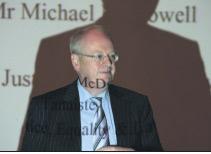Facilitating McDowell

Michael McDowell continues to repeat assertions that have no basis in fact and rarely is he challenged. In yet another facilitatory interview (this time in the Sunday Tribune, 7 January) Michael McDowell made several controversial, unchallenged claims. By Vincent Browne
“The political commentating class has a chronic habit of writing off the Progressive Democrats which is very strange.”
Following the 1989 general election, when the Progressive Democrats lost eight of the 14 seats they had won in the 1987 general election (including his own), Michael McDowell phoned senior colleagues in his party and advised them the party should be wound up. He said the defeat was crushing and it was “over” for the PDs. Mary Harney quietly pointed out to him that it certainly was not over for the PDs as Fianna Fáil could not get back to government without the support of the PDs. There followed the first Fianna Fáil-PD coalition, that one led by Charles Haughey.
Did any political commentator ever get it that wrong?
“We are not in the business of election pacts and we've always made that clear.”
Not true. In 1989 the PDs entered into a pre-election pact with Fine Gael to keep Fianna Fáil out of office. Having sought support on that basis, the party did precisely the opposite by entering government with Fianna Fáil.
Also prior to the 1997 election there was a pact between Bertie Ahern and Mary Harney that, if successful, the two parties would go into government together.
“Slump coalition.”
Repeatedly in the Sunday Tribune interview, Michael McDowell referred to the proposed Fine Gael-Labour coalition as “the slump coalition”. According to the Department of Finance (Budgetary and Economic Statistics: August 2006), the following are the Gross National Product (GNP) growth rates since 1989 (the figure for 2006 is an estimated one).
1989 4.7%
1990 6.5 %
1991 2.0 %
1992 2.5 %
1993 3.0 %
1994 6.5 %
1995 8.0 %
1996 7.8 %
1997 10.3%
1998 7.7%
1999 8.5%
2000 12.3%
2001 3.8%
2002 2.8%
2003 5.5%
2004 3.9%
2005 5.4%
2006 5.6%
The lowest growth rate for the period (2.0 per cent) was when the PDs were in office. The growth rate took off once Labour came into office (1992-1997). The second highest growth rate during these years was in 1997 (10.3 per cent) when the “slump coalition” was in power, Fine Gael and Labour, accompanied by the most left-wing party (supposedly) that has ever been in office in Ireland, Democratic Left.
The lowest growth rate we have had since 1992 was in 2002 (2.8 per cent) was the year that Fianna Fáil and the Progressive Democrats were last returned to office.
So which is the “slump coalition”? Fine Gael and Labour, which saw an average growth rate of 8.7 per cent when they were in power? Or the present Fianna Fáil-Labour coalition which has seen an average growth rate of 4.8 per cent?
In other words, the growth rate while Fine Gael and Labour was last in office was twice the rate it has been since the last election when Fianna Fáil and the PDs have been in office. Which is the slump coalition?
“I've said that the people changed the [bail] law in 1997 and it's up to the legislators to ensure that change is fully reflected in our statute law and then it's up to the various institutions of state [by which he means the courts] to ensure it operates in the way that the people want.”
The change in the law that occurred in 1997 was the constitutional amendment allowing judges to take into account the likelihood that an accused person would commit crimes while on bail in deciding whether to grant bail. The law does not require the courts to refuse bail, they may use their discretion. Accused persons are frequently denied bail on the evidence of gardaí who state they believe there is likelihood they will commit crimes if released. The insinuation that the courts are ignoring what the people decided is simply untrue.
The deprivation of a person's liberty not for crimes he/she has committed but for crimes they might commit is a strange perversion of justice but that is what the people decided in 1997 and that is what the courts now do on a regular basis.
“In virtually every western society there always has been a left [wing] bias. We don't have a significant non-left based set of media in Ireland.”
What mainstream media in Ireland is not non-left? All the newspapers in the Independent Newspapers group (the Irish Independent, the Sunday Independent, the Evening Herald, the Sunday World, the Star, the Sunday Tribune and the Star Sunday) all are right-wing. The Irish Times has veered markedly rightwards in the last several years. The Irish Daily Mail is right-wing. RTÉ, both in its news, its general current affairs presentations and its presenters, reflect almost uniformly a right-wing bias.
